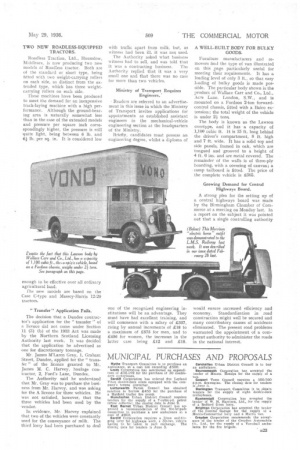TWO NEW ROADLESS-EQUIPPED TRACTORS.
Page 37

If you've noticed an error in this article please click here to report it so we can fix it.
Roadless Traction, Ltd., Hounslow, Middlesex, is now producing two new models of Roadless tractor. Both are of the standard or short type, being fitted with two weight-carrying rollers on each side, as distinct from the extended type, which has three weightcarrying rollers on each side.
These machines have been produced to meet the demand for an inexpensive track-laying machine with a high performance. Although the ground-bearing area is naturally somewhat less
• than in the case of the extended models and pressure per square inch correspondingly higher, the pressure is still .quite light, being between 6 lb. and 6i lb. per sq. in. It is cOnsidered low
enough to be effective over all ordinary agricultural land.
fhe new models are based on the Case C-type and Massey-Harris 12-20 tractors.
" Transfer" Application Fails.
The decision that a Dundee contractor's application for the " transfer" of a licence did not come under Section 11 (3) (b) of the 1933 Act was made by the Northern Scotland Licensing Authority last week. It was decided that the application be advertised as one for discretionary tonnage.
Mr. James M'Laren Gray, 1, Graham Street, Dundee, applied for the " transfer " of the licence granted to Mr. James M. C. Harvey, haulage contractor, 2, Ford's Lane, Dundee.
The Authority said he understood that Mr. Gray was to purchase the business from Mr. Harvey, and was asking for the A licence for three vehicles. He was not satisfied, however, that the three vehicles had been used by the vendor.
In evidence, Mr. Harvey explained that two of vehicles were constantly used for the conveyance of milk. The third lorry had been purchased to deal with traffic apart front milk, but, as witness had been ill, it was not used. The Authority asked what business witness had to sell, and was told that it was a contracting business. The Authority replied that it was a very small one and that there was no case for more than two vehicles.
Ministry of Transport Requires
Engineers.
• Readers are referred to an advertisement in this issue in which the Ministry of Transport invites applications for appointments as established assistant engineers in the mechanical-vehicle engineering section at the headquarters of the Ministry.
Briefly, candidates must possess an engineering degree, whilst a diploma of one of the recognized engineering institutions will be an advantage. They must have had excellent training, and will commence with a salary of £337, rising by annual increments of £18 to a maximum of £575 for men, and to £456 for women, the increases in the latter case being £12 and £18. A WELL-BUILT BODY FOR BULKY GOODS.
Furniture manufacturers and removers find the type of van illustrated on this „page particularly useful for meeting their requirements. It has a loading level of only 3 ft., so that easy loading of bulky goods is made possible. The particular body shown is the product of Wallace Carr and Co., Ltd., Acre Lane, London, S.W., and is mounted on a Fordson 2-ton forwardcontrol chassis, fitted with a Baico extension ; the total weight of the vehicle is under 2i tons.
The body is known as the Lawson o-vertype, and it has a capacity of 1,100 cubic ft. It is 15 ft. long behind the driver's compartment, 8 ft. high and 7 ft. wide, It has a solid top and side panels, framed in oak, which are tongued and grooved to a height of 4 ft. 6 ins, and are metal covered. The remainder of the walls is of three-ply boarding, with a covering of canvas; a
• lamp tailboard is fitted. The price of the complete vehicle is £305.
Growing Demand for Central Highways Board.
A strong plea for the setting up of a central highways board was made by the Birmingham Chamber of Commerce at a meeting on Monday last. In a report on the subject it was pointed out that a single controlling authority
would ensure increased efficiency and economy. Standardization in road construction might well be secured and many contributory causes of accidents eliminated. The present road problems warranted the appointment of a competent authority to administer the roads in the national interest.




























































































